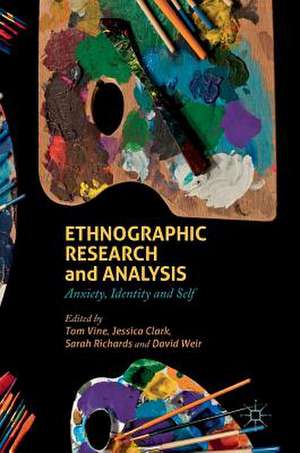Ethnographic Research and Analysis: Anxiety, Identity and Self
Editat de Tom Vine, Jessica Clark, Sarah Richards, David Weiren Limba Engleză Hardback – 28 noi 2017
Taking the position that collections of ethnographic work are better presented as transdisciplinary bricolage rather than as discipline-specific series, each chapter in the collection begins with a reflection on the existing impact and character of ethnographic research within the author’s native discipline. The book will appeal to all academic researchers with an interest in qualitative methods, as well as to advanced undergraduate and postgraduate students.
Preț: 948.79 lei
Preț vechi: 1157.06 lei
-18% Nou
Puncte Express: 1423
Preț estimativ în valută:
181.55€ • 189.18$ • 150.32£
181.55€ • 189.18$ • 150.32£
Carte tipărită la comandă
Livrare economică 03-17 aprilie
Preluare comenzi: 021 569.72.76
Specificații
ISBN-13: 9781137585547
ISBN-10: 1137585544
Pagini: 315
Ilustrații: XI, 315 p. 4 illus., 1 illus. in color.
Dimensiuni: 148 x 210 x 24 mm
Greutate: 0.54 kg
Ediția:1st ed. 2018
Editura: Palgrave Macmillan UK
Colecția Palgrave Macmillan
Locul publicării:London, United Kingdom
ISBN-10: 1137585544
Pagini: 315
Ilustrații: XI, 315 p. 4 illus., 1 illus. in color.
Dimensiuni: 148 x 210 x 24 mm
Greutate: 0.54 kg
Ediția:1st ed. 2018
Editura: Palgrave Macmillan UK
Colecția Palgrave Macmillan
Locul publicării:London, United Kingdom
Cuprins
Chapter 1. Introduction; Tom Vine, Jessica Clark, Sarah Richards & David Weir.- Chapter 2. Home-grown Exoticism? Identity Tales from a New Age Intentional Community; Tom Vine.- Chapter 3. Wrestling with Online Avatars: Technology and Sexual Transformation; Paul Driscoll-Evans.- Chapter 4. Chóng ér fēi: Cultural Performances of Belonging in Intercountry Adoptive Families; Sarah Richards.- Chapter 5. Ethnographic Practices of Listening; Allison Boggis.- Chapter 6. Discussion and Collaboration in Diagnostic Radiography; Ruth Strudwick.- Chapter 7. Living with Uncertainty: The Ethnographer’s Burden; Steve Barnes.- Chapter 8. Managing Dissonance in Identity Construction; Derek Shaw.- Chapter 9. What Makes the Autoethnographic Analysis Authentic?; David Weir & Daniel Clarke.- Chapter 10. Inside the Sausage Factory: An Autoethnography of Working in a For-Profit University; Katie Best.- Chapter 11. An Auto-Ethnographic account of Gender and Workflow processes in a Commercial Laundry; David Weir.- Chapter 12. The Salience of Emotions in (Auto)Ethnography: Towards an Analytical Framework; Ilaria Boncori.- Chapter 13. It’s More than Deciding What to Wank Into: Negotiating an Unconventional Fatherhood; John Hadlow.- Chapter 14. Hate the Results? Blame the Methods: An Autoethnography of Contract Research; Will Thomas & Mirjam Southwell.- Chapter 15. Collaborative Autoethnography: Enhancing Reflexive Communication Processes; Ngaire Bissett, Sharon Saunders & Carolina Bouten Pinto.- Chapter 16. Methodology: From Paradigms to Paradox; Tom Vine.
Notă biografică
Tom Vine is a senior lecturer at the University of Suffolk, UK. He leads a suite of MBA programmes at Suffolk Business School where he actively encourages his students to engage with a diverse range of scholarly research beyond the realm of business studies. He is also committed to expanding hitherto marginalised research methodologies in his field.
Jessica Clark is a senior lecturer at the University of Suffolk, UK. She is a sociologist publishing in the fields of children's sexual cultures, contemporary boyhoods, children and popular culture and methodological issues in research with children.
David Weir is Professor of Intercultural Management at York St John University, UK. He teaches intercultural management and has published widely on organizational culture in the MENA countries and written in a variety of ethnographic styles.
Caracteristici
Promotes a transdisciplinary approach for ethnographic research Reframes long standing ethnographic discussions, such as those concerning positionality and reflexivity Demonstrates the value and versatility of ethnography as a research method
